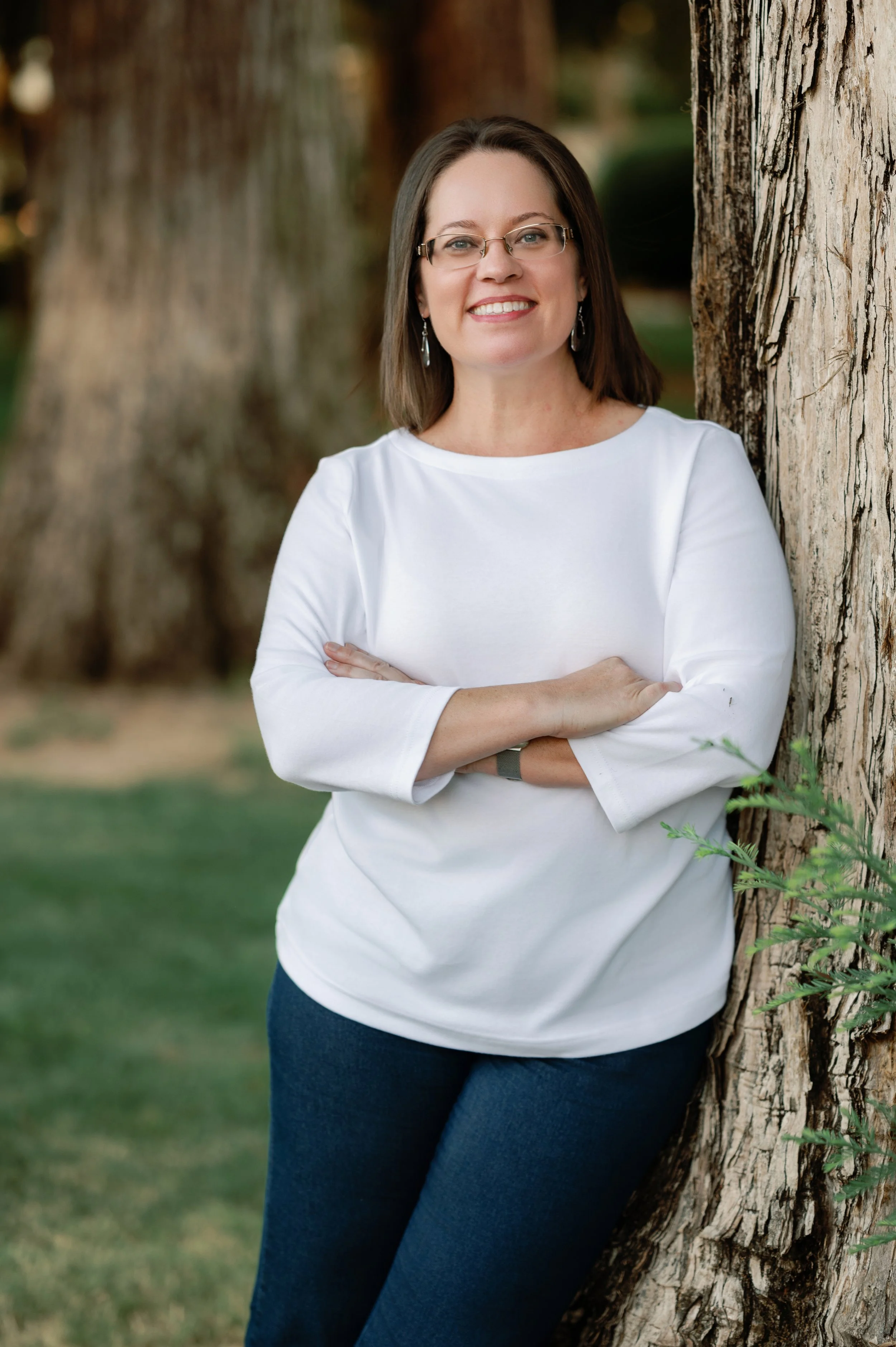
Online sessions throughout Idaho | Idaho Mental or Behavioral Telehealth - Social Worker #9371387
Therapy for Adoptive Parents in Boise, ID
Serving Boise, Meridian, Eagle, Star, and throughout the Treasure Valley
Specialized Trauma Therapy for Parents in the Adoption Journey
You did the home study, completed all the required trainings, read everything you could find about adoption and trauma. You thought you were prepared.
But nobody warned you about what happens after: the depression that moved in when your child came home and refuses to leave no matter how hard you try, the way your body goes into complete panic mode when your child melts down because their dysregulation triggers yours, the grief from that failed adoption that still feels raw months later, the exhaustion that goes so much deeper than just needing sleep.
You're functioning on the surface, getting your child to appointments and school, posting the family photos everyone expects. But internally you're carrying chronic chest tightness, jaw pain from constant clenching, and an isolation that's getting worse because you can't explain this reality to other Boise parents without either downplaying it completely or revealing too much.
The shame of struggling when you "wanted this" makes asking for help feel impossible.
What Boise Adoptive Parents Are Quietly Dealing With
-
Post-adoption depression arrived when joy was supposed to.
You expected to feel grateful, overwhelmed with love, complete. Instead you woke up feeling hollow, went through the motions of caregiving while feeling disconnected, smiled for announcement photos while feeling empty inside. Research shows 10-32% of adoptive parents experience this - both mothers and fathers - but nobody talks about it openly because admitting depression after your child arrives feels like admitting you made a mistake. The guilt about not feeling instant connection is overwhelming, and you're terrified that struggling means you're not meant to be this child's parent.
-
Your child's dysregulation sends your own nervous system into crisis mode.
Every meltdown triggers fight-or-flight in your body - heart pounding, hands shaking, stomach churning like you're facing real danger. You're hypervigilant in your own home, constantly scanning for warning signs, unable to truly relax even during quiet moments. Some days you know intellectually that you love your child but can't feel it through the fog. You're realizing that absorbing their trauma and witnessing their pain every single day is creating trauma in your own nervous system.
-
The failed adoption still occupies real estate in your heart.
You bonded with that baby for months, supported the birth mother through her pregnancy, prepared your home and told everyone your news. Then she chose to parent, which was her right and which you respect logically, but emotionally you're grieving a child who was never legally yours. Boise friends suggest you "try again" without understanding that the thought of risking this kind of heartbreak again feels unbearable, even though you still desperately want to be a parent.
-
Foster-to-adopt keeps reopening wounds.
You showed up for every court-ordered visit, advocated for your foster child's needs, loved them while trying to protect your heart. Then reunification happened, which was always the goal and which you genuinely wanted for that child, but the grief still overwhelms you. Nobody seems to understand why you're not "over it" after a few weeks. You're stuck between truly wanting what's best for them and mourning the family you thought you were building, and the thought of another placement feels impossible.
-
Infertility grief came back after your child arrived.
You thought adoption would heal that wound, that parenthood would be enough. Instead the grief ambushes you: filling out school forms with blank family medical history, hearing comments about how your child doesn't look like you, wondering late at night if biological children would be easier, seeing pregnancy announcements and feeling that familiar ache. You feel guilty for these thoughts, like grieving what never was means you're not fully grateful for the child you have.
The Stress of Fostering and Adopting
This isn't stress you can fix with better organization or more self-care. Your body is physically holding every loss, every traumatic moment, every day of walking on eggshells.
You're having panic attacks seemingly out of nowhere, your heart suddenly racing. You lie awake at 3am replaying the day in excruciating detail, analyzing every mistake, spiraling into catastrophic thinking. You're snapping at your partner over minor things because your nervous system is completely maxed out.
You're avoiding other Boise parents at school events because their complaints about bedtime routines feel worlds apart from what you're dealing with daily, and you don't know how to bridge that gap without making everyone uncomfortable. You can't post honestly in adoption Facebook groups without risking harsh judgment. Support from your agency evaporated after finalization. Even your own family keeps saying "but isn't this what you wanted?" like wanting to be a parent should somehow erase every hard thing about how you actually became one.
The exhaustion runs deeper than lack of sleep. It's bone-deep weariness from carrying multiple griefs simultaneously: for the biological children you'll never have, for your child's birth family and their losses, for the imagined family life that doesn't match reality, for the version of yourself you're losing to constant crisis management.
Why Adoptive Parents Need Specialized Services
You may have already tried traditional therapy. Your therapist was probably kind but kept offering parenting strategies when you needed trauma treatment for yourself. Or they focused entirely on your child's healing with no acknowledgment that you're drowning too, that loving a traumatized child can traumatize you.
Maybe they simply didn't understand adoption, and you spent sessions educating them instead of getting help. Research shows 75% of adoptive parents rate their therapists as not adoption-competent - this isn't something you're imagining.
Here's the reality: traditional talk therapy works well for processing thoughts and feelings, for understanding patterns. But when trauma lives in your body - when your heart races at certain triggers, when your chest stays constantly tight, when grief feels physically heavy, when your nervous system is stuck in threat mode - you need approaches that work with your body and nervous system, not just your thoughts.
Trauma-Focused Approaches That Help Boise Adoptive Parents Heal Long-Term
EMDR (Eye Movement Desensitization Reprocessing)
Helps your brain file traumatic memories in the past where they belong instead of treating them like current threats. The moment you learned the adoption fell through, the day your foster child left, the first time you felt nothing when your child said "I love you" - we process these so they stop hijacking your present. You can think about difficult moments without your body reacting like they're happening now, drive past significant locations without your chest tightening, and look at photos from painful times without completely falling apart.
Internal Family Systems (IFS)
Recognizes that you have different parts with competing needs, each trying to protect you in their own way. The part that loves your child fiercely, the part that's exhausted and wants to quit, the part grieving your imagined family, the part desperate to be perfect - instead of these parts creating internal war, they learn to work together. You can stop beating yourself up for contradictory feelings, make decisions from internal alignment instead of constant turmoil, and respond to your child from your values instead of your triggers.
Brainspotting
Locates where trauma and grief are stored in your brain and nervous system, then helps release them without forcing you to relive every painful detail repeatedly. You don't have to retell the story over and over to heal from it. You can process the failed adoption, the depression, the secondary trauma without retraumatizing yourself in therapy, getting relief without those emotionally exhausting talk therapy sessions.
Accelerated Resolution Therapy (ART)
Can rapidly reduce trauma symptoms and intrusive thoughts, often providing significant relief in just a few sessions instead of months or years of traditional therapy. It's particularly effective for haunting images: seeing the birth mother walk away with the baby, replaying your child's most extreme meltdown, the look on the caseworker's face when they said your foster child was leaving. You can get meaningful relief faster, function better in daily life, and not spend years in therapy just reaching a baseline of okay.
Somatic Therapy
works directly with your body's trauma responses. Those shoulders holding chronic tension, that chest carrying grief and anxiety, that stomach churning when the phone rings, that jaw clenched so tight it aches - we help your nervous system learn to regulate again. You can actually relax during quiet moments instead of staying perpetually braced, sleep through the night without jolting awake, breathe deeply without constant restriction, and be present with your child instead of just surviving their presence.
What Boise Adoptive Parents Experience Through This Work
Your nervous system learns to settle even when your child doesn't. You develop tools to calm your fight-or-flight response when their behaviors trigger you, and your body remembers what safety feels like even during chaos. You can stay calmer during their meltdowns without escalating alongside them, handle bedtime with more patience, make parenting decisions from clarity instead of panic, sit through family meals without constant anxiety, and actually enjoy playing with your child instead of just watching for problems.
The depression gradually lifts. The numbness gives way to feeling things again - both the difficult emotions and the good ones you've been missing. You can laugh genuinely at your child's jokes, feel real affection when they hug you, reconnect with your partner intimately, look forward to weekend activities, feel excitement about milestones, and take family photos where your smile feels authentic instead of forced.
Shame loses its grip as you understand that struggling doesn't equal failing. Needing help doesn't mean you made the wrong choice. You can tell your partner when you need breaks, be honest with your therapist or trusted friends about hard days, set boundaries with relatives who don't understand, advocate for your family's needs with schools and providers, and stop feeling like you have to perform constant happiness for others.
Grief becomes something you can hold without drowning. Whether it's grief from infertility, failed adoptions, or the family life you imagined, you learn to honor these losses without being consumed. You can attend baby showers without falling apart, answer questions about adoption without defensiveness, look at photos from difficult times without spiraling, fill out school forms with missing medical history without feeling broken, celebrate Mother's Day or Father's Day without feeling like an imposter, and be genuinely happy for pregnant friends.
You sleep through the night and wake with energy. Your body releases constant vigilance, and 3am anxiety spirals happen less frequently. You can fall asleep without replaying every mistake, wake up without immediate dread, have energy for exercise or friendships, focus during work meetings, remember things without writing everything down, and handle bedtime routines with genuine patience.
You reconnect with who you were before trauma took over. Underneath the exhaustion and crisis management, you rediscover yourself. You can pick up hobbies you abandoned, have conversations about topics beyond your child's struggles, make career decisions that excite you, plan trips without paralyzing guilt, say yes to social invitations, pursue your own interests, and remember what brings you joy beyond just getting through each day.
Your capacity expands naturally through healing. When your nervous system isn't constantly activated, when depression isn't draining your energy, when shame isn't weighing everything down, you simply have more to give. You can show up for therapy appointments and school meetings without resentment building, attend support groups without defensiveness, reconnect with your partner emotionally and physically, return calls and texts from friends, host people at your house, and be present during homework time without constantly checking your phone to escape.
Virtual Therapy Throughout Idaho
I provide secure telehealth sessions for adoptive parents across Idaho, including throughout Boise and the Treasure Valley. You can meet with me from your home, your car during lunch, or any private space with internet; no commute added to your already full schedule.
Session options:
50-minute sessions: $300
90-minute sessions: $450
4-hour intensives: $1,200
I offer flexible scheduling including early mornings, evenings, and weekends.
I'm a private-pay provider and don't take insurance directly. I can provide documentation (Superbills) for out-of-network reimbursement if your insurance plan offers it.
Meet Summer
I work with adoptive parents throughout Boise and the Treasure Valley because I understand that adoption doesn't just affect your child, it profoundly impacts you too.
I've been licensed to independently practice in California since 2015 (CA LCSW #68507). I have 9 years of experience in child welfare and adoption and I completed training through the National Adoption Competency Mental Health Training Initiative (NTI).
I specialize in supporting adoptive parents through their own mental health challenges: post-adoption depression, secondary trauma, and the grief and burnout that comes with this journey.
Using specialized trauma approaches, I help you heal from failed adoptions, process your own trauma responses, and find sustainable ways to manage ongoing stress without losing yourself in the process.
Idaho License:
FAQs
-
All sessions are conducted online through secure telehealth. You can meet with me from anywhere in Idaho - your home, office, or even your car if that's your only private space. For Boise parents juggling work, therapy appointments for your child, school meetings, and everything else, virtual sessions eliminate commute time and maximize scheduling flexibility.
-
Traditional talk therapy helps you understand thoughts and process feelings, which has value but often isn't enough when trauma is stored in your body. The specialized approaches I use - EMDR, Brainspotting, Accelerated Resolution Therapy, Internal Family Systems, and Somatic therapy - work directly with your nervous system to release trauma at a deeper level. These aren't just coping strategies; they help your brain and body actually process and resolve traumatic experiences so they stop controlling your present. Many adoptive parents find that years of traditional therapy helped them understand their struggles without actually relieving them - body-based trauma work creates the real change.
-
It depends on what you're working on and which approaches we use. Accelerated Resolution Therapy is designed for focused short-term work - many parents experience significant relief within 3-5 sessions when addressing specific traumatic memories like a failed adoption or placement disruption. Others work with me for several months to process multiple layers: infertility grief, failed placements, post-adoption depression, secondary trauma from their child's behaviors. Traditional cognitive-behavioral therapy often takes years to see meaningful change - these body-based methods are significantly more efficient. We'll discuss your specific goals in our first session and create a realistic timeline.
-
Absolutely. I work with adoptive parents at every stage: waiting to be matched, supporting a birth mother through pregnancy, recovering from a failed placement, navigating foster-to-adopt uncertainty, newly home with your child, or years into parenting. Your struggles are valid regardless of where you are in the legal process - you don't need to wait for finalization to get support.
-
I'm a private-pay provider because it allows me to focus on what actually helps you heal rather than what insurance companies reimburse, which is often limited to approaches that don't work well for adoption trauma. However, I can provide detailed Superbills for out-of-network reimbursement if your insurance plan offers that benefit. Many adoptive parents find that investing in specialized trauma therapy saves them years of ineffective but insurance-covered talk therapy that doesn't address root issues.

Work With Someone Who Understands Adoption Trauma
You don't have to keep carrying this alone. You need someone with real experience in child welfare and adoption who understands the specific trauma of this journey; not generic listening, but expert help for what you're going through.
Let's talk about how trauma therapy can help you heal while you continue loving your child.
Contact Summersverhines.lcsw@gmail.com
(855) 564-3338
P.O. Box 28
Wilton, CA 95693

